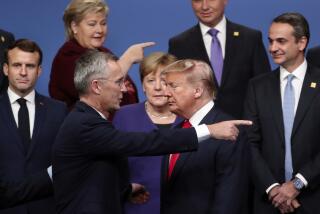Clinton Joins Dutch Gala for Marshall Plan
- Share via
ROTTERDAM, Netherlands — As a symbol of the United States’ long-term commitment to Europe, President Clinton on Wednesday visited this booming Dutch port that was bombed to rubble in World War II, and residents greeted him with a “Thank you, America” rally in honor of the U.S. aid that saved their city.
“We are proud that the Marshall Plan gave Rotterdam a new start,” Clinton told the crowd of several thousand, referring to the massive postwar reconstruction of Europe--including the vanquished wartime foes Germany and Italy--by a victorious United States. Many of those assembled remembered when their nation’s dikes were bombed, their homes were destroyed and their economy was pulverized half a century ago.
“Together,” Clinton said at the evening celebration, “we can complete the journey [postwar Secretary of State George C.] Marshall’s generation began and bring all of Europe together--not by force of arms, but by the possibilities of peace.”
Clinton spoke at a glitzy outdoor gala, held at the waterfront in commemoration of the 50th anniversary of the Marshall Plan. People cheered as he unveiled a plaque in Marshall’s honor. It was a welcome high point for the president, whose European visit was overshadowed Tuesday by a Supreme Court decision at home that could leave him open to a sexual harassment lawsuit.
Reporters showed more interest in asking about the ruling on Paula Corbin Jones’ lawsuit than his three-nation tour of Europe, but the president denied that he had been distracted from the business at hand: “This is too big,” he said.
Clinton has sought to showcase his vision of a peaceful, undivided Europe led by a growing Atlantic alliance throughout his trip, which began Tuesday and is set to end today when he meets British Prime Minister Tony Blair in London before flying back to Washington.
On Wednesday, Clinton argued that lessons from the past--a past whose searing images of war are still commonly remembered--underscore the need for cooperation between longtime adversaries in Eastern Europe and the West. In making his case, the president repeatedly recalled the success of the Marshall Plan.
“We must summon the spirit of the Marshall Plan for the next 50 years and beyond,” Clinton said Wednesday in The Hague, where about 30 European leaders met earlier in the day for separate anniversary events. Clinton urged them “to build a Europe that is democratic, at peace and undivided for the first time in history.”
His speech moved German Chancellor Helmut Kohl to tears.
“For a teenage boy in Germany, Marshall aid was the generous hand that helped lift his homeland from its ruinous past,” Clinton said. “He still recalls the American trucks driving onto the schoolyard, bringing soup that warmed hearts and hands. That boy grew up to be a passionate champion of freedom and unity in Europe, and a great and cherished friend of America.”
As Clinton spoke, Kohl--the subject of his anecdote--was crying.
Delivering a toast at a luncheon hosted by Queen Beatrix in Clinton’s honor, the president declared: “We are the trustees of history’s rarest gift--a second chance to complete the job that Marshall and his generation began. . . . The daunting challenge in Marshall’s time was to repair the damage of a devastating war. Now we face the equally ambitious task of promoting peace, security and prosperity for all the people of Europe.”
While many diplomats in Europe ask whether the White House vision of a unified Europe contains a touch of naivete, or at least a lack of appreciation of the weight of history felt by many here, Clinton’s remarks met a friendly audience in both cities Wednesday. For many at the “Thank you, America” rally in this giant port, the comments were linked to memories of war and reconstruction.
“After five years of war, there was no food, there was no money, there was nothing,” recalled J.M. Huysmans, 65, a retired bookkeeper. “You come from America. You have no idea what it means to be a poor country.”
“Thanks to the Americans,” he said, “a great part of the city has been rebuilt.”
Frank Schaap, 37, whose parents remember when Germany bombed the dikes on their island, causing a flood of saltwater that ruined homes and wheat fields, said the public today has “mixed feelings” toward the U.S. assistance.
“People feel a lot of respect toward the United States,” the pharmacist said, “but some also see it as an investment to create a new market that America needed badly” after the war.
Standing against the backdrop of the modernistic Erasmus Bridge, Clinton suggested that the United States and the Netherlands share bonds of history and culture.
“No nation contributed to our building more than did yours,” he said. “From this great pier, more than a million Dutch men and women started their journey to America.”
Clinton said he honors the generation that took on the massive task of postwar rebuilding.
Following his remarks, the president pulled a lever and the sides of a fake carton gave way, revealing a bronze likeness of Marshall set in stone. As Marshall’s image flashed on a huge screen, rock-concert style, the audience broke into enthusiastic applause. Then balloons were released into the clear twilight sky.
Earlier in the day, Clinton set a more somber tone at the commemoration ceremony in The Hague, noting that the Marshall Plan stimulated Europe’s war-ravaged economies by providing such tools as “nets for Norwegian fishermen, wool for Austrian weavers, tractors for French and Italian farmers, machines for Dutch entrepreneurs.”
The plan “offered a cure,” he said, “not a crutch. It was never a handout. It was always a hand up.”
More to Read
Get the L.A. Times Politics newsletter
Deeply reported insights into legislation, politics and policy from Sacramento, Washington and beyond. In your inbox twice per week.
You may occasionally receive promotional content from the Los Angeles Times.










